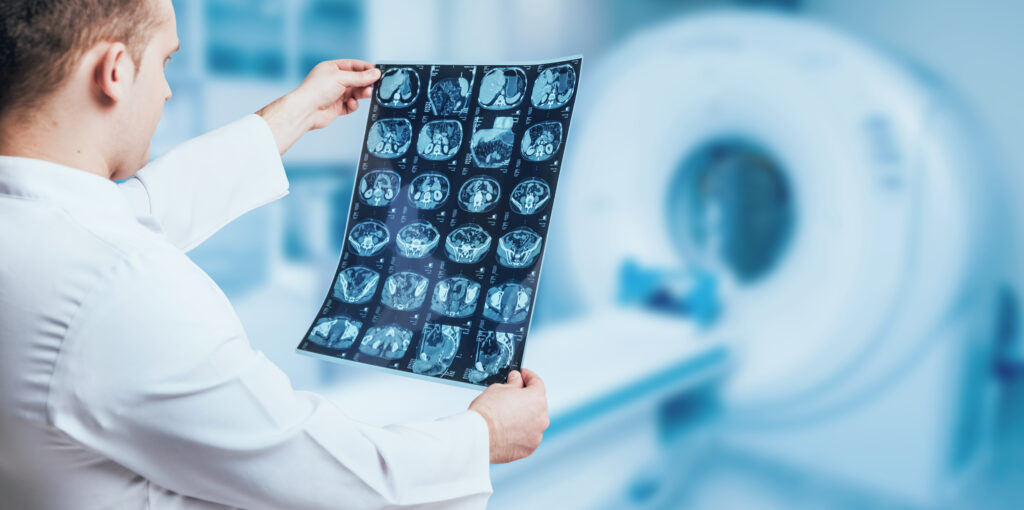There are many different scans used for imaging the brain. Here at Echelon Health, we understand that booking a brain scan can be unnerving. You may require more information on which scans are best for imaging the brain. This guide will discuss this topic in more detail, covering the types of brain scans available, why someone might need one, and what to expect.
What Is A Brain Scan?
A brain scan can refer to one type of scan, like an MRI – or a combination. They are a neuroimaging technique that can help evaluate a list of health issues such as injuries, illnesses, and diseases like brain cancer. A brain scan produces detailed images of the inside of your brain. The images allow radiologists to detect medical conditions, which helps them give a confident diagnosis further down the line. The type of brain scan you require will depend on the complexity of your health concerns. For example, some brain scans will be more suitable for detecting injuries than others.
What Does A Brain Scan Show?
A brain scan will show medical professionals detailed images of the inside of your head. These images give doctors vital insight to help them detect:
- Tumours
- Brain diseases
- Causes of a stroke
- Dementia
- Brain damage
- Brain aneurysm
- ADHD
- Mental health conditions
- Infections
And more. Using these images, doctors can detect early signs of severe health issues. As a result, they can work quickly to treat and manage the condition before it worsens. This emphasises just how important these brain scans are. Not only do they detect issues, but they also save lives.
Different Brain Scan Types
There are many different types of brain scans. Below, we have explored each one in more detail – to strengthen your understanding of their uses and how they work, starting with a brain MRI scan.
MRI Brain Scan
An MRI brain scan uses large magnetic – radio waves to produce detailed images of the inside of the brain. No radiation is used, making this a safer option. MRI scans can help diagnose health problems such as tumours, inflammation, and infections. The MRI works by passing an electric current through coiled wires. This creates a magnetic field in your body. The receiver in the machine then receives radio waves, which produce detailed images of the brain.
CT Brain Scan
A CT scan uses specialist X-ray equipment to take detailed images of the head from different angles. The X-ray moves in circular motions around the head and is non-invasive. A CT scan is commonly used to assess head injuries – and other symptoms such as chronic migraines. The speed at which these scans work makes them ideal for trauma-related cases and other neurological emergencies. Unfortunately, CT scans use radiation, which poses a risk to pregnant women and those who take diabetes medication.
EEG Brain Scan
This scan records brain activity. Small sensors attached to the scalp pick up electric signals produced by the brain. A machine records these signals before a doctor analyses the results. An EEG brain scan is mainly used to detect and investigate epilepsy. This is a condition that causes repeated seizures. It can help doctors identify the cause of these seizures and the type of epilepsy a patient suffers from.
Brain PET Scan
A PET scan produces 3D images of the brain. It uses a substance called a tracer to identify areas of the brain that are more active than others. It gives doctors a clear overview of how the brain is functioning. A PET scan allows doctors to detect cancer and how it spreads to the brain. It is also commonly used to diagnose dementia, such as Alzheimer’s disease. The scan is more invasive than others, as it requires a special dye to be injected into the veins through an IV. The scan usually takes up to one hour to complete.
What Is The Best Brain Scan?
There are many ways to scan the brain and specific scans are more suitable for different people. This is because of what they can detect and be used to diagnose. For example, CT scans are best for imaging the brain in trauma-related cases. This is because CT scans are a lot faster than a scan like an MRI. However, MRI scans do not expose patients to radiation and are more suited to imaging the brain and the surrounding veins and arteries. Therefore, they are the best technique for children needing brain scans and those who require more than one imaging examination. There are pros and cons to each scan. To find the best one for you, you must consider the purpose of your scan. Our team at Echelon Health can give you our expert guidance to help you find the best brain scan for your unique situation.
How To Get A Brain Scan?
If you would like to get a brain scan, you will need to see your doctor or a consultant. Once you have been assessed, they will decide whether a referral for a brain scan is necessary. Alternatively, you can book an individual brain scan or enquire about one of Echelon’s bespoke health packages.
There are several reasons why someone may require a brain scan. If you have suffered a recent blow to the head, been involved in an accident, or been previously diagnosed with cancer, a brain scan can examine your health to detect any life-threatening issues. You may also be referred for a brain scan if you experience any of the following symptoms:
- Seizures
- Blurred vision
- Difficulty speaking
- Loss of motor abilities
- Loss of hearing and other senses
- Chronic migraines, headaches, and dizziness
Brain Scan Cost UK
You can choose to book a private health assessment with Echelon Health. We provide a range of scans and are proud to say we are home to the best scanning technologies through our CT, MRI and ultrasound scanners which are operated by some of the world’s leading radiographers.
The MRI Brain scan encompasses the brain and the surrounding veins and arteries in addition to the sinuses and inner ears and is usually the gold standard for imaging the brain in regards to early disease detection. Prostate MRI is also included as part of the male package.
Our flagship Platinum Assessment includes the brain MRI scan, as well as a plethora of other scans and comprehensive blood tests which combined allow us to detect up to 92% of preventable causes of death among men and up to 95% among women.
The following diseases can be detected through our Platinum Assessment:
- Osteoporosis
- Vascular Dementia
- Cerebrovascular Disease
- Arteriovenous Malformation
- Brain Cancer
- Cancer of Sinuses
- Acoustic Neuroma
- Carotid Artery Atheroma
- Thyroid Cancer
- Lung Cancer
- Acute Lung Diseases
- Aortic Aneurysm
- Chronic Respiratory Disease
- Pulmonary Fibrosis
- Coronary Heart Disease
- Breast Cancer
- Skin Cancer
- Liver Cancer
- Spleen Enlargement
- Gallbladder Disease
- Adrenal Gland Tumours
- Kidney Cancer
- Diverticular Disease
- Colorectal Cancer
- Bladder Cancer
- Prostate Cancer
- Testicular Cancer
- Cancer of the Ovaries
At Echelon health, we also offer a range of area specific health packages focusing on cancer or your heart health. With our expert guidance, you can choose which scans you would like to undergo. If you would like to know more about our custom packages, please don’t hesitate to book a consultation or scan with one of our highly skilled specialists.
Sources:
https://www.echelon.health
https://www.echelon.health/about/team/
https://www.echelon.health/individual-services/packages-and-prices/
https://www.echelon.health/contact/



